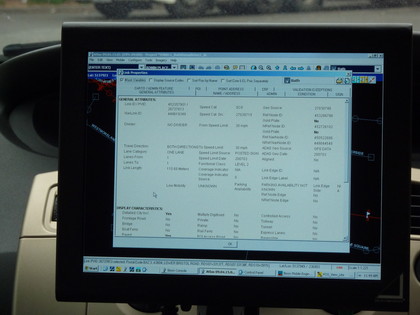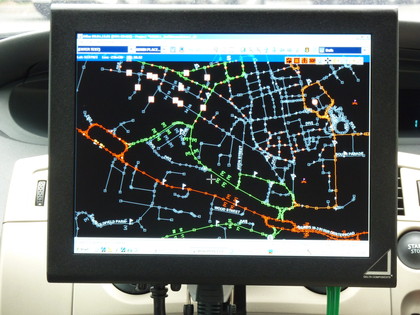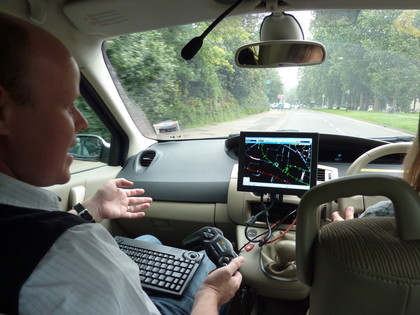Street to screen: how sat-nav maps are made
TechRadar goes on the road with Navteq's mapping car
Childs showed us how Navteq maps new streets by removing a small part of Bath from his test map and re-doing it. The map itself is coded back at the office from the information collected on the road. As the car is driven along, Childs is in the passenger seat, recording the pattern of the street as well as any navigational issues, such as one-way streets or corners that are too difficult to turn down.

There are also additional issues he can record for Navteq's Transport navigation systems such as weight tolerances for bridges or things like steep bends that aren't good for lorries. He has a keyboard with an integral trackball plus a joypad to record the navigational issues. In addition, there's a microphone so Childs can provide audio commentary on what he's mapping – details such as street names and house numbers. It's pretty intensive work.
Each section of road is referred to as a link and can have hundreds of attributes – everything from what kind of vehicles are allowed down it to local speed limits and the number of lanes.

Local authorities are a good source of information regarding changes to street layouts, directions and the like, while the Highway Agency and The AA inform them of major schemes. Navteq also overlays its own postcode information with that of the Royal Mail's, so it can identify non-mapped locations.
"Anything that doesn't match comes through, things like missing roads and spelling mistakes," adds Childs. "We always drive major road projects. In my experience what is published in the traffic order and what is built is not necessarily the same thing. One local authority sent me a traffic order. They were changing a section of road to 50mph. I drove it, it wasn't done. I drove it six months later and they still hadn't done it. Last week I got a call from a customer saying it was 50."
Childs and the other Geographic Analysts covering the south part of England are based in Exeter. The British Isles offices were opened in 1994. The six locations have 33 geographic analysts in total, for whom local knowledge is key.
Mapping has become big business. Navteq employs some 4,000 people in 77 countries worldwide, 1,000 of which are geographic analysts. 19 million miles of road is already databased to spread its mapping to developing countries especially.
Sign up for breaking news, reviews, opinion, top tech deals, and more.

Childs says the geographic analysts will be given targets to fulfil each quarter, such as driving all the Function Class 1 roads – motorways and major A-roads – in the area they cover. "In an ideal world you'd drive every road every year, but there's too much out there," he says.
He has worked on other projects which take him further away from his Exeter base, such as mapping South Africa, for example. There is a single-camera version of the kit which is portable and Childs can take this with him when he goes abroad – all it needs is a cigarette lighter socket and his laptop. This was a problem when he once hired a car without one!
Childs also works on other projects such as the Navteq Discover Cities mapping project that works out pedestrian walking directions using 53 pedestrian-specific map attributes. Childs says this is recorded using a PDA with integrated GPS receiver. He points at a new development near TechRadar HQ in Bath – "When that's done I shall be back on foot with a PDA and GPS," he muses. "There's no substitute for getting that on foot."
-------------------------------------------------------------------------------------------------------
Liked this? Then check out our Hands on: Co-Pilot for iPhone review
Sign up for TechRadar's free Weird Week in Tech newsletter
Get the oddest tech stories of the week, plus the most popular news and reviews delivered straight to your inbox. Sign up at http://www.techradar.com/register
Dan (Twitter, Google+) is TechRadar's Former Deputy Editor and is now in charge at our sister site T3.com. Covering all things computing, internet and mobile he's a seasoned regular at major tech shows such as CES, IFA and Mobile World Congress. Dan has also been a tech expert for many outlets including BBC Radio 4, 5Live and the World Service, The Sun and ITV News.